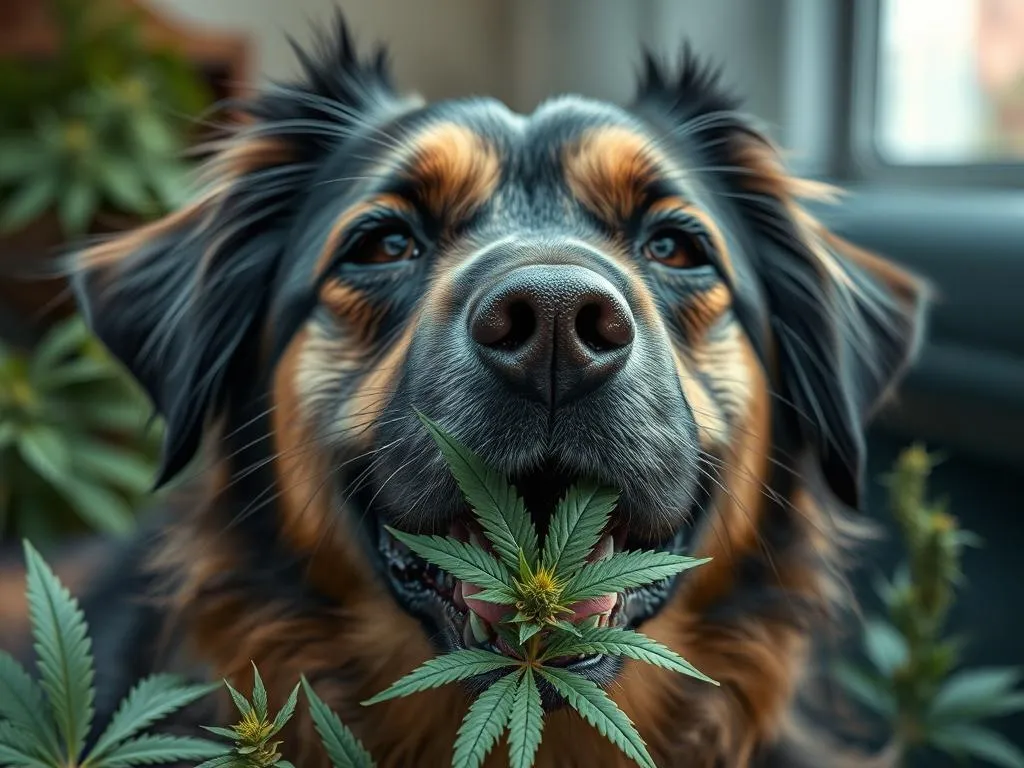
Introduction
As marijuana use becomes increasingly common due to its legalization in various regions, pet owners must be aware of the potential risks associated with dogs ingesting marijuana. My dog ate marijuana is a phrase that can induce panic among dog owners, and rightfully so. Understanding the effects of marijuana on dogs and knowing how to respond can be the difference between a minor issue and a serious health crisis. This article aims to provide dog owners with the essential information needed to navigate the situation if their dog accidentally consumes marijuana, including the symptoms to watch for and preventive measures to take.
Understanding Marijuana and Its Effects on Dogs
What is Marijuana?
Marijuana is a plant that contains various compounds, the most notable being tetrahydrocannabinol (THC) and cannabidiol (CBD). THC is the psychoactive component that causes the “high” associated with marijuana use, while CBD is non-psychoactive and is often touted for its potential therapeutic benefits. Marijuana can come in several forms, including edibles, oils, and dried plant material, each having different concentrations of THC and CBD, which can impact how they affect dogs.
How Marijuana Affects Dogs
Dogs have an endocannabinoid system, similar to humans, which helps regulate various physiological processes. However, dogs metabolize THC much more slowly than humans do, making them more susceptible to its toxic effects. When a dog ingests marijuana, it can lead to symptoms ranging from mild lethargy to severe neurologic signs. Common symptoms of marijuana toxicity in dogs include:
- Lethargy
- Incoordination
- Drooling
- Vomiting
- Increased sensitivity to stimuli
Legalization and Its Impact on Dog Health
With the legalization of marijuana in many areas, there has been a noticeable increase in the number of cases of dogs accidentally consuming marijuana. This rise is often attributed to the increased availability of marijuana products, particularly edibles, which may attract pets due to their smell and taste. As more dog owners partake in marijuana use, the risk of accidental ingestion also escalates, making it crucial for all pet owners to be informed about the potential dangers.
Symptoms of Marijuana Ingestion in Dogs
Immediate Symptoms
When a dog ingests marijuana, the initial symptoms can manifest quickly. These can include:
- Lethargy: Dogs may seem unusually tired or inactive.
- Incoordination: Difficulty walking or standing, often referred to as “wobbly.”
- Drooling: Excessive salivation may occur.
- Vomiting: Some dogs may vomit shortly after ingestion as their body tries to expel the substance.
Severe Symptoms
In more severe cases of marijuana ingestion, a dog may exhibit alarming symptoms such as:
- Seizures: Involuntary muscle contractions that may indicate severe toxicity.
- Tremors: Shaking or trembling, often uncontrollable.
- Coma: In extreme cases, dogs may lose consciousness and require immediate veterinary attention.
Duration of Symptoms
The duration of symptoms can vary based on several factors, including the amount of marijuana ingested and the size of the dog. Generally, symptoms can last anywhere from a few hours to several days. Small dogs that consume even a small amount of marijuana may experience more severe and prolonged symptoms than larger dogs.
What to Do If Your Dog Eats Marijuana
Assessing the Situation
If you find yourself in the distressing situation of thinking, my dog ate marijuana, it’s important to assess the situation calmly. Determine the amount and type of marijuana ingested, as well as your dog’s size and overall health status. This information will be crucial when seeking veterinary care.
Contacting a Veterinarian
Timely veterinary intervention is essential in cases of marijuana ingestion. Contact your veterinarian or an emergency animal clinic immediately. Be prepared to provide crucial information, including:
- The type of marijuana (edible, oil, plant)
- The estimated amount ingested
- Your dog’s weight and any pre-existing health conditions
Potential Treatments
Veterinary treatment may vary based on the severity of the situation. Common treatment options include:
- Observation: If the ingestion was minimal and the dog is stable, the vet may recommend monitoring at home.
- Induced Vomiting: If the ingestion was recent, the veterinarian may induce vomiting to prevent further absorption of THC.
- IV Fluids: For dehydrated or severely affected dogs, intravenous fluids may be administered to help flush out toxins and maintain hydration.
- Supportive Care: This may include medications to manage symptoms such as seizures or anxiety.
When to Seek Emergency Care
Immediate veterinary care is necessary if your dog shows any severe symptoms, such as seizures or coma. Additionally, if your dog ingests a large amount of marijuana or if you’re unsure of the amount consumed, it’s better to err on the side of caution and seek emergency care.
Long-Term Effects of Marijuana Ingestion
Potential Health Risks
While many dogs recover from marijuana ingestion without long-term effects, some may experience health issues depending on the severity of the toxicity. Potential long-term risks include:
- Behavioral Changes: Some dogs may exhibit changes in behavior, such as increased anxiety or aggression.
- Cognitive Impairment: In rare cases, severe marijuana toxicity could lead to lasting cognitive deficits or changes in mental health.
Recovery Process
The recovery timeline can vary widely among dogs. Most dogs will begin to show improvement within 24 to 72 hours, but some may require longer to return to their normal behavior. Close monitoring during recovery is essential to ensure that any lingering symptoms are addressed promptly.
Preventive Measures for Dog Owners
Safe Storage Practices
To prevent accidental ingestion, it’s crucial to practice safe storage of marijuana products. Store all marijuana, especially edibles, in high, secure cabinets or containers that are out of reach of pets. Consider using child-proof containers to further minimize the risk.
Educating Family and Guests
Informing family members and guests about the risks associated with marijuana for dogs is essential. Ensure that everyone understands the importance of keeping marijuana products away from pets, especially in homes where dogs are present.
Alternatives to Marijuana for Dogs
For dog owners seeking alternatives for managing their pet’s anxiety or pain, consider non-toxic options. Products containing CBD specifically formulated for dogs can provide relief without the psychoactive effects of THC. Always consult with your veterinarian before introducing any new products.
Conclusion
In conclusion, the phrase my dog ate marijuana can be concerning for any dog owner. Understanding the potential effects of marijuana on dogs, recognizing the symptoms of ingestion, and knowing how to respond can make a significant difference in your dog’s health and well-being. By taking proactive measures to prevent accidental ingestion and educating those around you, you can help safeguard your furry friends from the risks associated with marijuana.
FAQs
Can dogs die from eating marijuana?
While fatalities from marijuana ingestion in dogs are rare, severe cases can lead to serious complications or even death, particularly if untreated.
How long does marijuana stay in a dog’s system?
The duration that marijuana remains in a dog’s system can vary based on factors like dosage and individual metabolism. Symptoms may last from a few hours to several days.
Are there different risks with marijuana edibles?
Yes, marijuana edibles often contain additional ingredients that can be toxic to dogs, such as chocolate, xylitol, or high sugar content, increasing the risks associated with ingestion.
What should I do if my dog is acting strangely, but I’m not sure if it’s marijuana-related?
If your dog is acting strangely or exhibiting unusual symptoms, it’s best to contact your veterinarian for guidance, especially if there’s a possibility they may have ingested marijuana or any other harmful substances.









